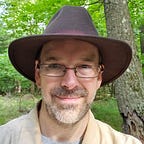The Lorax and the Lomax:
24 min readMay 17, 2023
Voices Crying out in the Wilderness.
“I have read many definitions of what is a conservationist, and written not a few myself, but I suspect that the best one is written not with a pen, but with an axe. It is a matter of what a man thinks about while chopping, or while deciding what to chop. A conservationist is one who is humbly aware that with each stroke he is writing his signature on the face…
